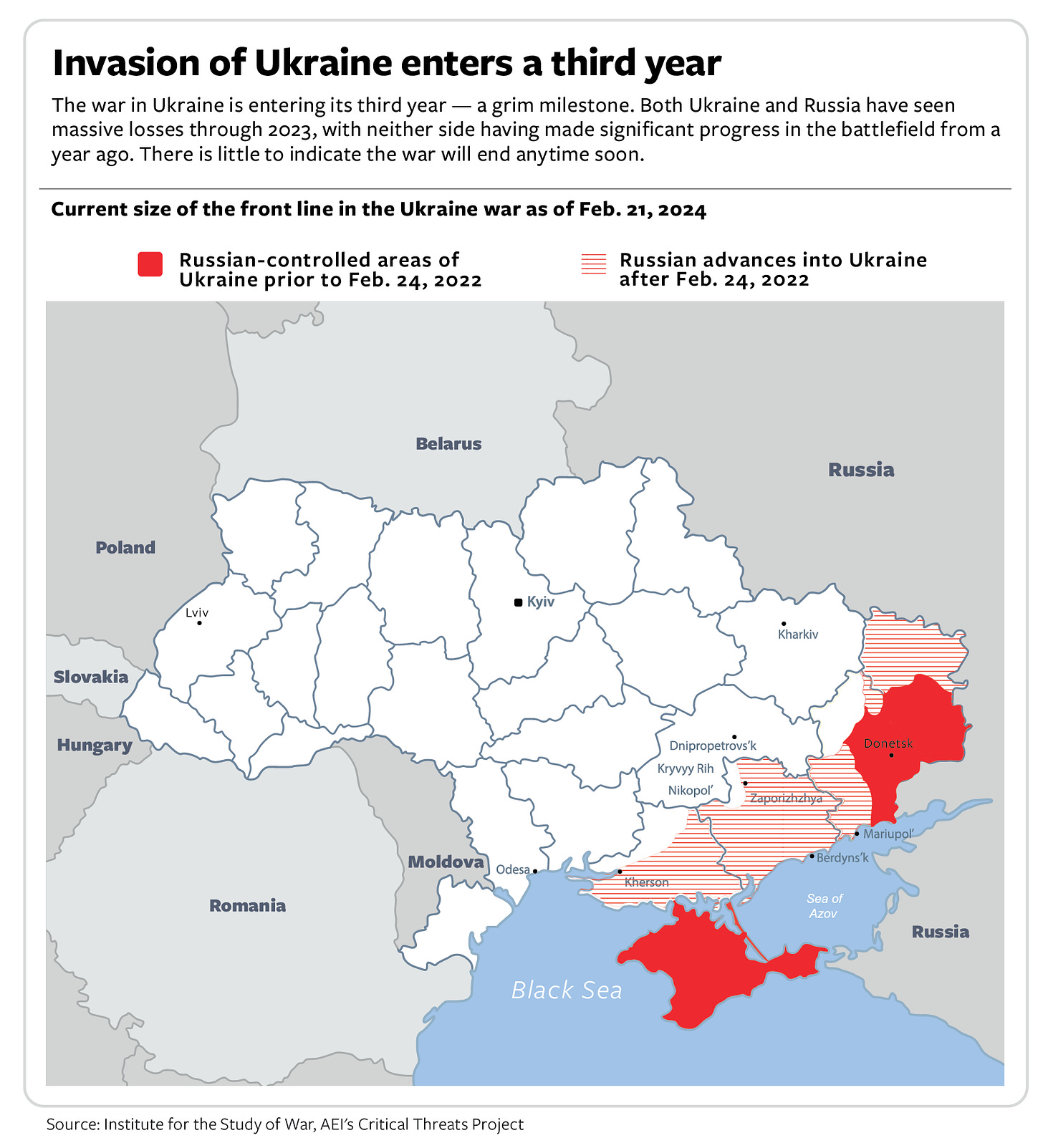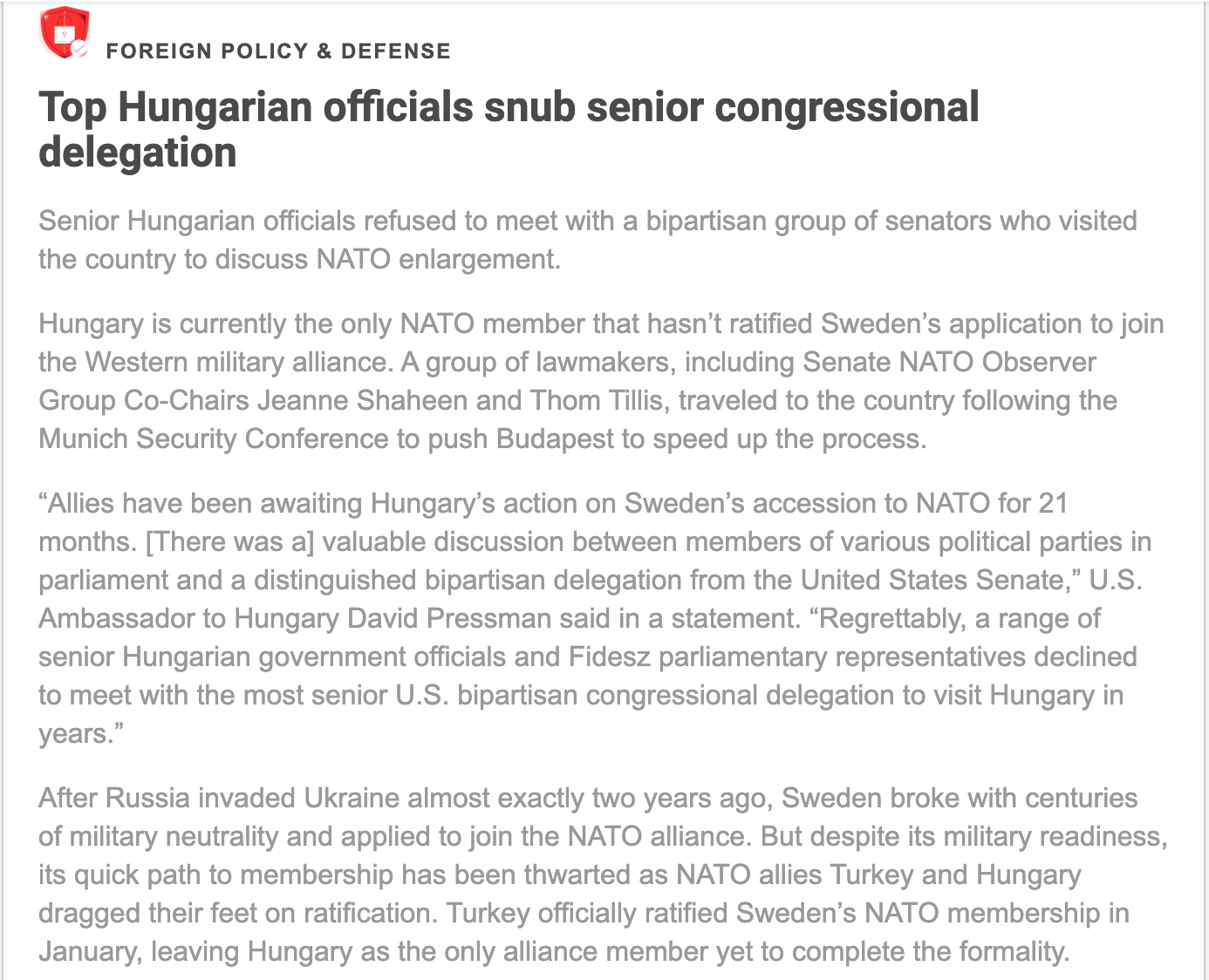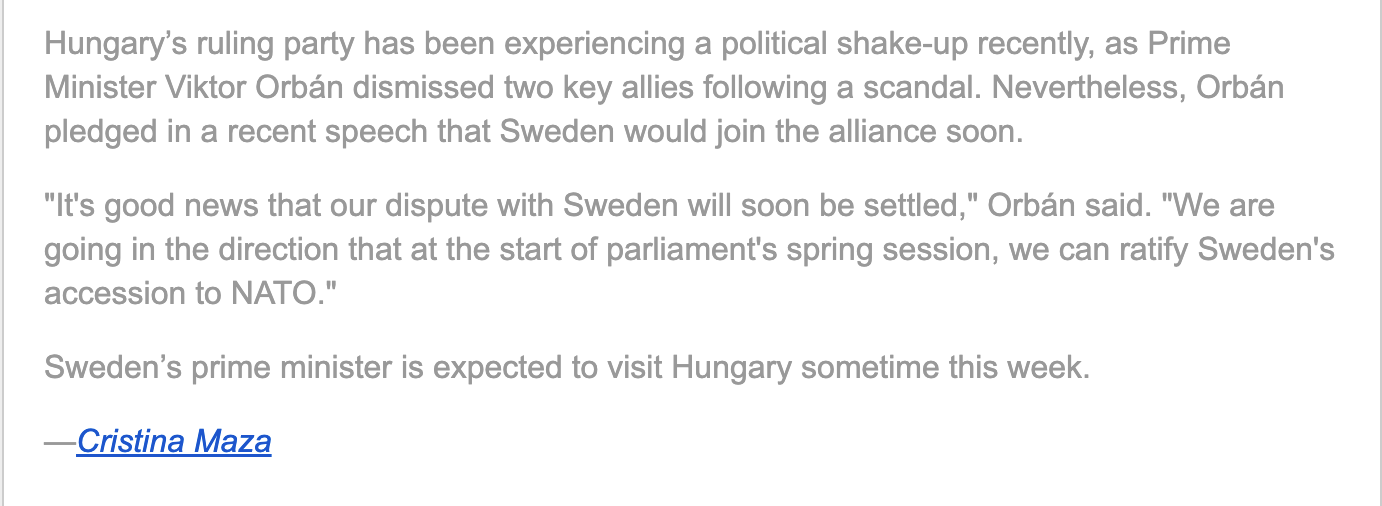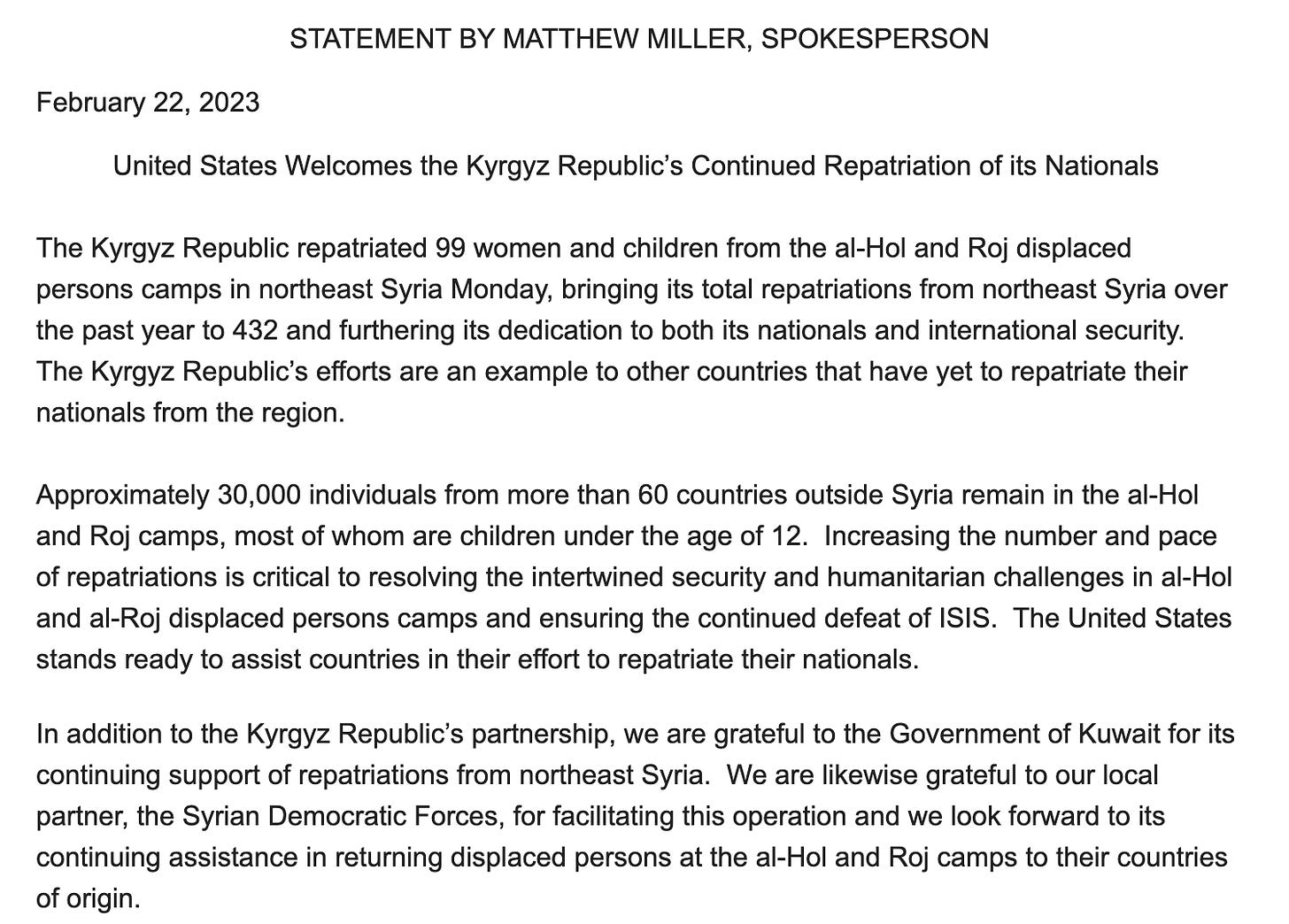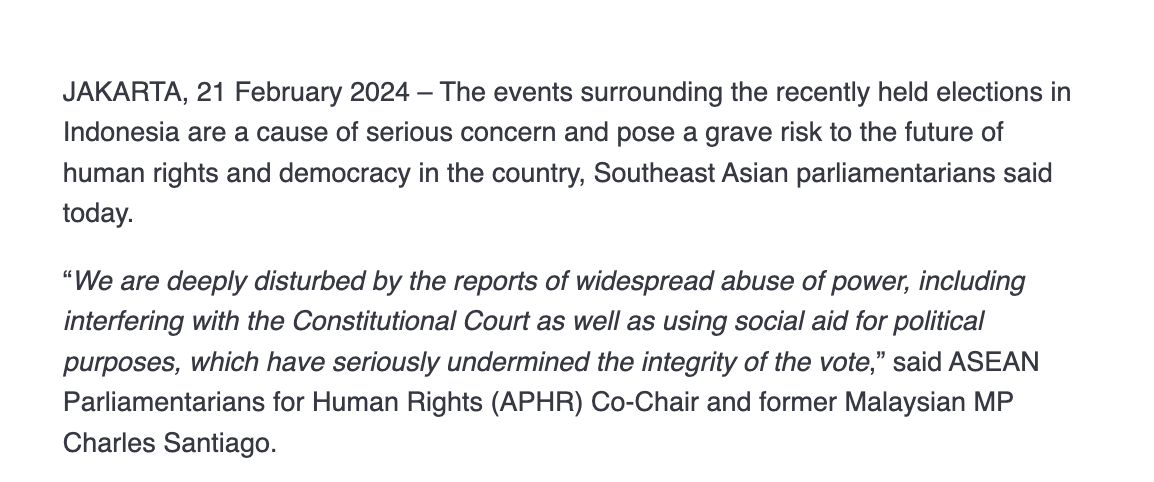Yesterday, Saturday, marked exactly two years since Russia invaded Ukraine.
For the article I wrote this week to mark this grim anniversary, I spoke to people in the country about their lives and how the war effort is going. The word I hear most often is “exhaustion.” People are tired of war, of airstrikes, of death. They are frustrated at being unable to plan their futures and depressed that international support is starting to wane.
Most of all, they know that if Russia moves into their towns or their cities, they will have to flee, abandon the place they call home, and perhaps never return because Russia’s armed forces assassinate civilians and leave a trail of other war crimes in their wake.
I spend a lot of time covering Congress and the debate over U.S. funding for Ukraine. One thing I’ve noticed lately is that the fate of the country, of the people of Ukraine, seems to be seeping ever so slightly out of the conversation as politics take over. People seem to have forgotten that funding directly impacts people on the ground and that people live or die as a result of whether Congress can appropriate funds. That wasn’t the case two years ago when Russia first invaded. But now, people have become desensitized to the idea of war, and it’s easier to approach a funding debate as if it were just a political matter. Ukrainians feel this shift.
Politics have also returned to Ukraine. While support for President Volodymyr Zelensky remains high, I hear more people express concern about internal politicking. There is criticism of the draft and martial law and how they affect families. The armed forces, too, are exhausted. They are defending their territory against terrible odds, with fewer fighters and less ammunition.
Kateryna Rashevska, a Ukrainian human rights defender, told me this week that “In every Ukrainian family, there is someone who sacrificed their life for freedom, the rule of law, and human rights.”
“Life is deferred with an unclear understanding of when peace will be restored in Ukraine,” she said. “The occupation of Ukrainian cities — Bucha, Borodyanka, Mariupol, Izyum — demonstrates that Russia is waging a genocidal war. Those disloyal to the aggressor state won’t merely be exterminated but will fall victim to atrocities such as torture, starvation, sexual violence, unlawful confinement, and deportation. Halting now means permitting Russia to commit these atrocities.”
It’s been four years since I last visited the country. It was one of my last trips before the pandemic ground travel to a halt. I was there for work, and I spent a few days after I’d finished my reporting in Kyiv, seeing friends, wandering streets packed with tourists, shopping for good coffee beans, visiting churches, buying a small ceramic black cat, and picking up pharmaceuticals that are too expensive in America. Frivolous activities that feel romantic in the moment, like all traveling does, because it takes you out of your head. I think back on that Ukraine a lot, about the toy poodle who sat on my lap in a coffee shop and the little boutique where I almost got a tattoo. I’ve written about that trip and my nostalgia for Ukraine before.
I know that Ukraine is still there, bubbling under the surface, waiting for the war to end. My friends in the country tell me that Ukraine still peaks its head out sometimes, especially in Kyiv, on days when there are fewer airstrikes and people go to daytime parties because there’s a curfew at night. It’s there in the Kharkiv restaurants that reopen their doors every day despite how much of the city has been destroyed. People try, as we all would in those circumstances, to live as normally as possible.
I’m not a war reporter. You’re not going to find me on the frontlines around Avdiivka. But I miss Ukraine, and I hope to go back as soon as circumstances allow. I hope people don’t forget about that place as the war drags on.
What I’m writing:
• Tomorrow marks two years since Russia invaded Ukraine. I spoke to people about why they are fighting, how much territory Russia has taken, and how Ukraine can win and rebuild. This story is unlocked and free to read.
My colleague also made this map:
My weekly news blurbs:
What I’m reading:
• Resident Advisor has a great documentary about Karachi, Pakistan’s DIY electronic music scene.
• Ukrainian troops withdrew from Avdiivka, a key eastern town besieged by Russian forces, the BBC reports. Ukrainian authorities are investigating possible war crimes after the relatives of six Ukrainian soldiers were reportedly executed after surrendering following the takeover of Avdiivka.
• Russian forces claimed full control of the Soviet-era coke plant in the newly-fallen Ukrainian town of Avdiivka, Reuters reports.
• The Kremlin has been running a disinformation campaign to undermine Ukrainian President Volodymyr Zelenskyy, including by orchestrating the recent split with Ukrainian Gen. Valery Zaluzhny, documents shown to the Washington Post show.
• A former FBI informant charged with lying about the Biden family’s dealings in Ukraine told investigators after his arrest that Russian intelligence officials were involved in transmitting information to him about Hunter Biden, prosecutors said in a new court filing. CNN has the story.
• Russian independent newspaper Novaya Gazeta reported that Russian opposition leader Alexei Navalny’s body was being held in a local hospital’s morgue and had bruising on the chest. Navalny died in an Arctic prison.
• Thousands of Russians defied authorities to mourn Navalny. Risking arrest, many laid flowers in public places in major cities, including Moscow and St. Petersburg, Radio Free Europe reports. Russian police arrested hundreds of mourners.
• Russian President Vladimir Putin gifted a car to North Korean leader Kim Jong Un, North Korean state media reported, in another sign of strengthening ties between both countries. CNN has the story.
• Russia will contact Armenia after Prime Minister Nikol Pashinyan said his country has frozen its participation in the Russian-led Collective Security Treaty Organisation because the pact failed to protect Yerevan, Reuters reports.
• The Bosnian parliament’s upper chamber unanimously adopted an anti-corruption proposal to prevent money laundering and financing terrorist activities, according to the site European Western Balkans.
• Milorad Dodik, president of the Serbian part of Bosnia and Herzegovina, met Russian President Vladimir Putin in Kazan in southwest Russia, where the two leaders expressed mutual goodwill, Politico Europe reports.
• Albania’s parliament ratified a migration deal with Italy, allowing it to process centers for migrants in the Balkan country, Reuters reports.
• Hungary’s ruling Fidesz party nominated Tamás Sulyok, the president of the Constitutional Court, to replace Katalin Novak as Hungarian president.
• Hungary will sign a defense industry deal with Sweden and “lay down some goals about military cooperation,” Prime Minister Viktor Orban said ahead of a meeting with Swedish Prime Minister Ukf Kristersson in Budapest. Reuters has the story.
• Voice of America has an explainer on why Hungary is strengthening ties with Russia and China.
• China offered to support long-time strategic partner Hungary on public security issues, going beyond trade and investment relations, as the two countries mark their 75th year of diplomatic relations, Reuters reports.
• Hungary blocked a joint statement that the European Union was going to issue to mark the second anniversary of Russia's invasion of Ukraine, sources told Radio Free Europe.
• The International Court of Justice (ICJ) opened historic hearings into the legality of Israel’s 57-year occupation of lands sought for a Palestinian state, the Associated Press reports.
• Israel’s far-right ministers Itamar Ben-Gvir and Bezalel Smotrich called for tighter restrictions on Palestinians and new settlements following a fatal shooting by three Palestinians at an Israeli checkpoint in Jerusalem, NBC News reports.
• Israeli Prime Minister Benjamin Netanyahu’s plan for post-war Gaza does not bar a role for the Palestinian Authority and stresses that Israel will only allow reconstruction to occur after the enclave is demilitarized, Axios reports.
• Israel’s military ordered two neighborhoods of Gaza City to evacuate amid signs of hunger and mounting desperation, the New York Times reports. The evacuations came as the World Food Program halted deliveries in the north, describing scenes of chaos as its teams faced hungry crowds, looting, and gunfire.
• Israeli airstrikes targeted police officers guarding United Nations aid convoys in Gaza in recent weeks, causing the volume of aid delivery to collapse and exposing staff to criminal gangs and looting, the Washington Post reports.
• A far-left Israeli lawmaker, Ofer Cassif, narrowly avoided being expelled from Parliament after he backed efforts to charge Israel with genocide at the ICJ, the New York Times reports.
• Egypt has built more than 3 kilometers of wall in the past week in addition to further clearing over 16 square miles next to its border with Gaza, BBC Verify found. Egypt has denied it is making plans to house Palestinian refugees and said the area is intended as a “logistical hub” for aid.
• President Luiz Inácio Lula da Silva of Brazil recalled his ambassador to Israel as tensions escalated between the countries over the Brazilian president’s comments comparing Israel’s actions in Gaza to the holocaust, the New York Times reports.
• A debate in Britain’s parliament on calls for a ceasefire in Gaza descended into chaos after the speaker broke with convention to allow a vote on a Labour motion for an “immediate humanitarian ceasefire,” the BBC. Scottish National Party MPs and some Conservatives walked out of the chamber over the speaker’s handling of the vote, accusing him of allowing it to be “hijacked” by the opposition Labour Party.
• Russia invited all Palestinian factions, including Hamas, to meet in Moscow on February 26, CNN reports. Palestinian Authority Prime Minister Mohammad Shtayyeh said the PA, which is dominated by the Fatah political faction, is still seeking unity with Hamas.
• Iran is privately urging Hezbollah and other armed groups to exercise restraint against U.S. forces, the Washington Post reports.
• Armed groups that have been controlling Tripoli for more than a decade have agreed to vacate Libya’s capital, the BBC reports. Libya’s interior minister Imad Trabelsi said the deal was struck after lengthy negotiations for regular forces to police Tripoli, adding that the militia would be used “only in exceptional circumstances for specific missions.”
• The political rivals of Pakistan’s imprisoned former Prime Minister Imran Khan announced details of a power-sharing agreement, naming Shehbaz Sharif as their joint candidate for prime minister, the Associated Press reports.
• Prabowo Subianto, a former general who was once banned from entering the United States because of alleged human rights abuses, looks set to become the next President of Indonesia, TIME reports.
• In Myanmar, men aged 18 to 35 and women aged 18 to 27 can now be drafted into the army, the United Nations reports.
• Guinea’s self-appointed military leaders dissolved the government and will appoint a new one, Reuters reports.
• Some 90,000 people attended a rally in Mexico’s capital to protest against proposed changes to the electoral authority ahead of June’s presidential elections, the BBC reports. The opposition accuses current President Andrés Manuel López Obrador of attempting to weaken the National Electoral Institute (INE), an autonomous, non-partisan body.
Interesting statements:
You can write to me for any reason: c.maza@protonmail.com






